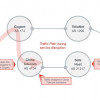Student spotted 'Trojan horse' hacker
A computer student potentially saved businesses millions after he spotted a hacking program infecting their systems.
The "Trojan horse" had already affected at least 400 companies across the world when Matthew Hillman detected it on his home PC.
Mr Hillman, from the Isle of Wight, was using a global chatroom facility when the hacking program, which behaves like a virus, appeared on his machine.
The 18-year-old believes he would not have seen the program, which can wipe out a hard drive, had it not been for what he has learnt on his course.
Mr Hillman immediately contacted the police on its discovery, after he traced the hacking source to a college in the USA.
Hampshire Police has now passed on the details to the FBI, which is investigating.
Mr Hillman said: "I initially thought it was the Code Red worm when it appeared.
"It suddenly flashed up at the bottom of the screen, and simply looked like a new program that had loaded up and then minimised itself on the screen."
He said that it looked very similar to the millennium edition of Microsoft's Windows package.
"It does the same thing as Code Red, but it is more controllable, though it puts itself on the system and starts running automatically," Mr Hillman added.
He believes that by not "clicking" on the icon he minimised the potential damage to his machine.
"However, like Code Red it "floods" someone's hard-drive and can cause major damage," Mr Hillman said.
He managed to establish that the "Trojan horse" had originated with a group of hackers known as Nostradam, who are thought to be electronics students.
"I was also able to establish that 431 firms and organisations, across countries like America, Canada and France had already been infected by it."
Take control
The "Trojan horse" is one of a genre of hacking programs, according to Symantec, an internet security company.
The company, based in Maidenhead, Berkshire, says it is detecting up to 20 new malicious virus-like programs a day.
Lucy Bunker, the firm's security communications manager, said the "Trojan horse" is different to a virus, because it does not replicate itself once it infects a computer network.
She said: "But like a virus, it can be unwittingly e-mailed by someone, and immediately start hacking in to a PC."
Ms Bunker explained it could appear on someone's machine as an "innocent" program, and enable a hacker to take complete control of a machine.
"You might, for instance, get sent a screensaver, which you download and it works normally - but behind that the "Trojan" has set to work," she added.









































































